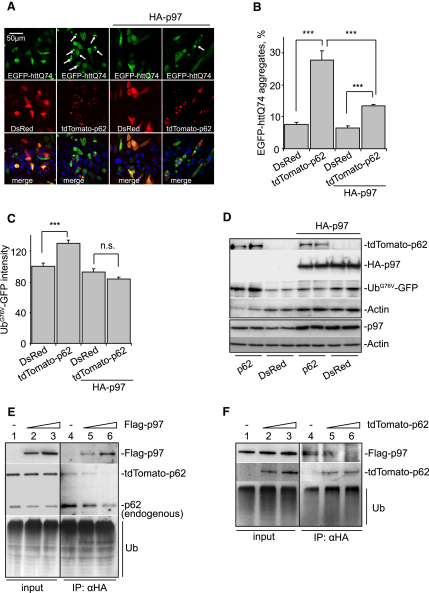Figure 6.
p97 Alleviates the Effects of p62 Overexpression
(A and B) p97 overexpression rescues increased polyQ aggregation caused by p62 overexpression. SK-N-SH cells were cotransfected with EGFP-httQ74, along with either DsRed or tdTomato-p62, and either pcDNA3.1 or HA-p97 at 0.5:1:1 ratio. (A) After 24 hr of incubation, cells were imaged. White arrows indicate cells containing EGFP-httQ74 aggregates. (B) The percentage of green/red double-positive cells with EGFP-httQ74 aggregates was quantified.
(C and D) p97 overexpression reduces elevated UbG76V-GFP levels caused by p62 overexpression. SK-N-SH cells were transfected as in (A), but EGFP-httQ74 was replaced with UbG76V-GFP. A total of 48 hr posttransfection, UbG76V-GFP levels were assessed either by FACS (C) or immunoblotting (D).
(E) p97 competes with p62 for ubiquitin binding. HeLa cells were cotransfected with HA-Ub, tdTomato-p62, and either pcDNA3.1 (lanes 1 and 4) or Flag-p97 at a p62:p97 molar ratio of 1:1 (lanes 2 and 5) or 1:2 (lanes 3 and 6). A total of 24 hr posttransfection, MG132 was added and cells were incubated for an additional 24 hr. Cells were subjected to immunoprecipitation with anti-HA antibody. Lysates (input) and immunoprecipitated samples (IP: αHA) were probed with antibodies against Flag epitope, p62, or ubiquitin.
(F) p62 prevents binding of p97 to ubiquitinated proteins. HeLa cells were cotransfected with HA-Ub, Flag-p97, and either pcDNA3.1 (lanes 1 and 4) or tdTomato-p62 at a p97:p62 DNA molar ratio of 1:1 (lanes 2 and 5) or 1:2 (lanes 3 and 6). A total of 24 hr posttransfection, MG132 was added for an additional 24 hr. Cells were subjected to immunoprecipitation as in (E).
For all of the graphs, data are shown as means ± SE for three separate experiments performed in triplicate. ∗∗∗p < 0.005, t test; all other comparisons are not significant (n.s.).

